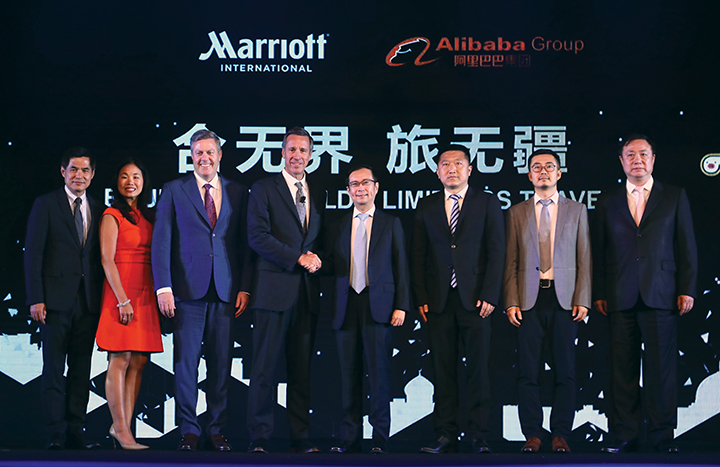NEW YORK—The temptation to say the new joint venture between megachain Marriott International and global e-commerce powerhouse Alibaba Group Holding Ltd. is going to open a lot of portals for the partners is hard to resist, primarily because, unlike a fairy tale out of the Arabian Nights, it’s true. Targeting outbound Chinese travelers, whose globe-trotting is expected to total 700 million trips in five years, the partnership is out to deliver what is anticipated as a seamless, curated, service-oriented experience to them.
Utilizing the expertise of both companies, Marriott’s “storefronts” are being placed on Alibaba’s travel-service platform known as Fliggy, where they will be managed by the JV and marketed to Alibaba’s more than half-billion active Chinese users. Properties in Marriott’s stable of 30 hotel brands are now available on the platform.
Additionally, programs, promotions and content for Marriott hotels worldwide are being customized for Chinese travelers and, ultimately, a link between Marriott’s and Alibaba’s loyalty programs will be implemented.

Arne Sorenson, president/CEO, Marriott International and Daniel Zhang, CEO of Alibaba Group, shake on the new JV. Flanking them are (left to right): Stephen Ho, Greater China region, Marriott International; Peggy Fang Roe, Marriott International; Craig Smith, Marriott International; Simon Li, Fliggy and Alibaba Group; Jiang Fan, Alibaba Group; and David Chai, Fliggy.
According to David Chai, VP of Fliggy, the JV will wrangle Marriott’s Chinese-language digital channels to include a combined Marriott and Starwood storefront where consumers can interact directly with Marriott, as well as access Chinese-language versions of the Marriott and (Starwood) SPG apps. Marriott will continue to have control of inventory, rates, customer data, customer relationships and marketing.
“As incomes rise, China’s middle class is looking for higher-quality products and new travel experiences,” noted Chai. “The travel industry is an important growth opportunity as China’s travelers are expected to take an estimated 700 million trips over the next five years. Fliggy…provides Chinese travelers with differentiated and personalized travel arrangements, enabling merchants to effectively target consumers online. Through partnering with Marriott, Alibaba aims to elevate and redefine the travel experience for Chinese consumers to be more seamless and personalized as they embark on adventures to discover the world.”
“The numbers are pretty staggering in terms of Chinese traveling outbound: 130 million roughly last year, 150 million this year,” said Stephanie Linnartz, Marriott’s global chief commercial officer. “That kind of volume is coming out of China when only 10% of Chinese nationals have passports. By comparison, some 41% of Americans have passports. As more and more Chinese—and especially the exploding middle class—get passports, these numbers get quite exponential…so the numbers are big in terms of opportunity.”
David Becker, CEO of New York-based AttractChina, which does content marketing and creates fully integrated marketing plans to connect Chinese tourists with U.S. travel brands and destinations, noted the numbers are, indeed, dramatic.
“If there are 120 million middle class in China today, by 2022, there will be 757 million, representing 54% of the population [see chart on page 51]. There’s going to be more than a fivefold increase in the number of Chinese—not just the mass middle, but what they call the upper middle class. The deal between Marriott and Alibaba is to reach that huge mass middle that is traveling. And travel is an incredibly important part of building life experiences for the Chinese consumer,” said Becker, noting the country’s economy is “lifting all boats” at this point. “We’ve gone from 1997, where it was almost impossible for a Chinese person to travel outside China, to a huge spike in terms of overall wealth,” he observed.
He added outside of Asia-Pacific, the United States is the number-one long-haul destination for the Chinese and goes beyond the cliché of travel groups following a tour guide with hoisted flag or umbrella.
“That is still there but it’s very quickly being supplanted by the free and independent traveler who is wealthier, aspirational. They’re really coming to have an experience different from their parents or their friends,” said the CEO.
Currently, there is an exclusivity arrangement between Marriott and Alibaba, but a spokesperson for Marriott did not disclose for how long. Similarly, the company did not divulge how the JV is structured. Both Marriott and Alibaba are making “a relatively modest investment in this,” said the spokesperson.
Marriott has been working with Alibaba for several years, selling inventory on AliTrip (now Fliggy), so the JV is “a natural evolution” of the relationship, Linnartz indicated.
The new initiative will run from planning, booking, paying and managing a trip to all of the activity associated with travel like shopping and local recommendations for dining and sightseeing, Chai noted. In addition, to keep up with the growth of mobile payment in China, the JV is ensuring “wallet-free,” cashless travel through Alibaba’s digital payment platform AliPay.
“We actually have AliPay in all of our China hotels already and are rolling it out globally now as part of this deal,” said Linnartz.
With the acquisition of Starwood Hotels & Resorts Worldwide last year, Marriott increased its footprint dramatically in Asia-Pacific, where Starwood outpaced it in number of hotels. “In China alone, between open hotels, pipeline and under construction, we’ll [now]have a little over roughly 600 hotels and 22 of our 30 brands,” said Linnartz, adding: “Even before the Alibaba deal, we knew we wanted to get Chinese business by having hotels in China and Asia-Pacific. Furthermore, we had an in-language website and app, which is part of this deal,” she said. “We actually rolled out a program called LiYu. It focused first in Asia-Pacific and it was about making sure that hotels were ready to welcome Chinese travelers with Mandarin speakers and with Chinese food, particularly at breakfast. We’re expanding this program now as part of the partnership to gateway cities around the world. The way we think about this relationship is really online to offline… Alibaba is an expert in the Chinese consumer. They’re the biggest e-commerce platform in China; 80% of e-commerce is done on Alibaba. They deeply know the Chinese consumer. We deeply know hotels and hospitality. You put those two together and I think you have a recipe for success and for winning a disproportionate share of the Chinese consumer’s business.”
She acknowledged all of Marriott’s more than 6,000 hotels would not participate in the outreach, which is targeted to markets with a lot of Chinese travelers, such as Japan, Thailand and Korea.
According to Chai, each online channel will be redesigned and upgraded to introduce and offer more personalized products and services.
“Members of both Alibaba and Marriott loyalty programs will benefit from Marriott’s personalized hospitality programs including LiYu,” he indicated, adding qualified Alibaba members also will be able to take advantage of Marriott’s SPG Ambassador program, which offers a personal concierge for members.
According to Chai, “Over time, the joint venture will create a next-generation loyalty program by linking the benefits of Marriott’s loyalty platform—Marriott Rewards, The Ritz-Carlton Rewards and SPG—with Alibaba’s member loyalty program. From reciprocal benefits and status-tier matching to the ability to exchange and redeem points between the two programs for travel planning and retail purchasing, the joint venture will draw on the insights of the combined consumers to redefine loyalty benefits.”
Linnartz indicated Marriott is continuing to look at ways to integrate its Marriott and SPG loyalty programs.
“Alibaba has 500 million active monthly users. We want to make sure we get those folks signed up for our loyalty programs, which is 100 million strong,” said Linnartz. “It’s on our road map.”
Also on that map is how to leverage Marriott’s retail offerings, such as bedding, linens, etc., as well as experiences, such as those the chain is offering through another recently inked strategic partner, PlacePass, an online meta-search platform.
“There’s all sorts of things we’re going to be doing in the months and years ahead,” said Linnartz. HB

